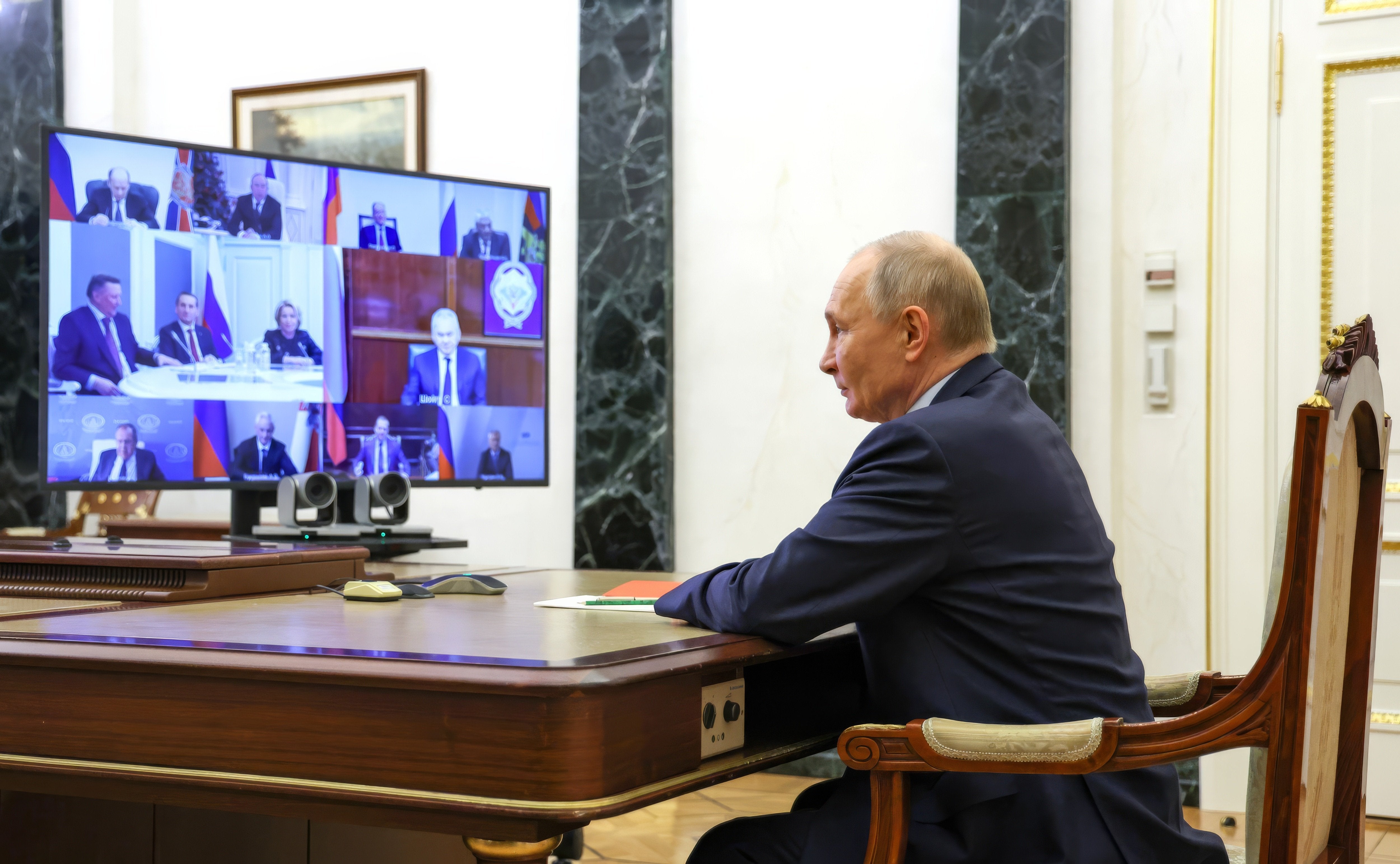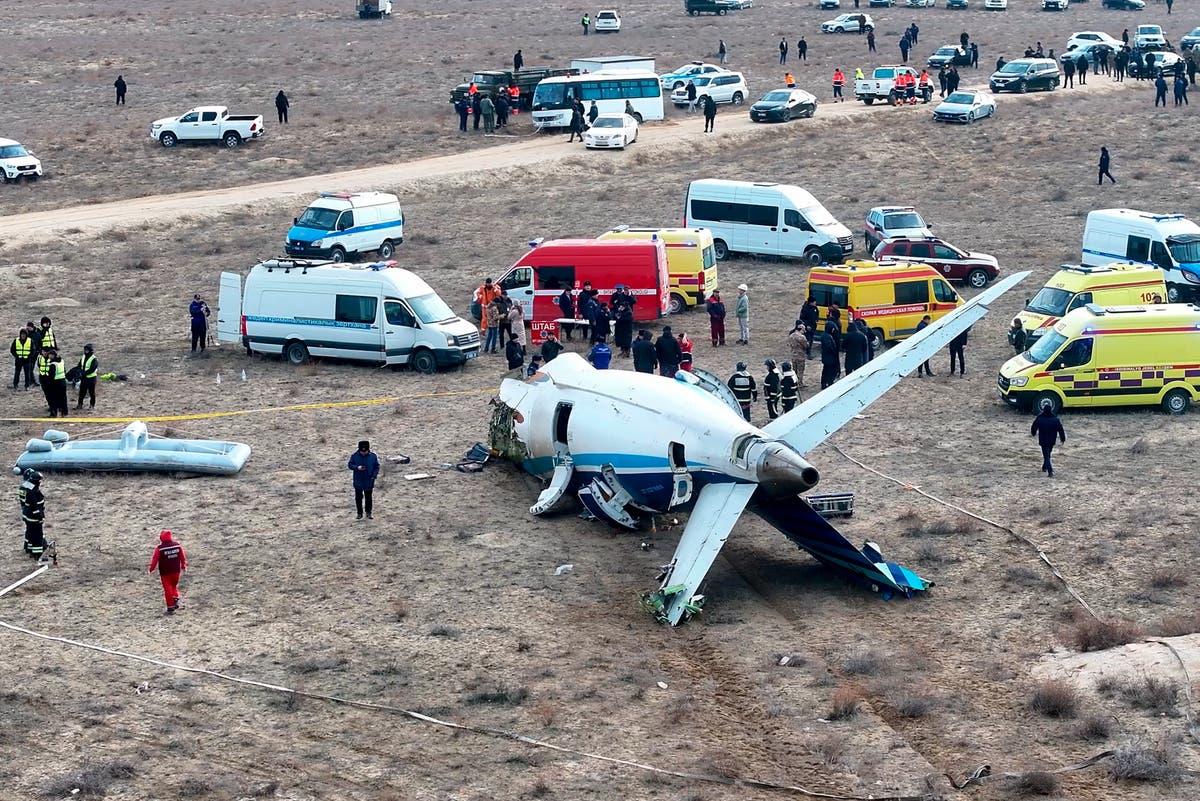Russian president Vladimir Putin has apologised to his Azerbaijani counterpart over a plane crash in Russian airspace that left dozens dead – but he stopped short of acknowledging Moscow’s possible responsibility for the incident despite mounting evidence to the contrary.
Flight J2-8243 crashed on Wednesday in a ball of fire near the city of Aktau in Kazakhstan after diverting from southern Russia, where Ukrainian drones were reported to be attacking several cities. At least 38 people were killed in the crash while 29 survived.
The plane was flying from Azerbaijan’s capital, Baku, to Grozny when it turned toward Kazakhstan, hundreds of miles across the Caspian Sea from its intended destination, and crashed while making an attempt to land.
The US has suggested Russia could be responsible for the downing of the plane, while sources in Azerbaijan claimed Russian air defence missiles hit the plane. Ukraine has also said the evidence “strongly points” to Russia’s culpability.

An official Kremlin statement issued on Saturday said air defence systems were firing near Grozny airport as the airliner “repeatedly” attempted to land there, but did not explicitly say one of these hit the plane.
“Vladimir Putin apologised for the tragic incident that occurred in Russian airspace and once again expressed his deep and sincere condolences to the families of the victims and wished a speedy recovery to the injured,” the statement said.
The readout said Russia has launched a criminal probe into the incident, and Azerbaijani state prosecutors have arrived in Grozny to participate. The Kremlin also said “relevant services” from Russia, Azerbaijan and Kazakhstan are jointly investigating the crash site.
According to a readout of the call provided by Azerbaijani president Ilham Aliyev’s press office, the leader told Mr Putin that the plane was subject to “external physical and technical interference”, although he also stopped short of blaming Russian air defences.
Mr Aliyev noted the plane had multiple holes in its fuselage and that the occupants had sustained injuries “due to foreign particles penetrating the cabin mid-flight”.
A US official and an Azerbaijani minister made separate statements on Friday blaming the crash on an external weapon, echoing those made by aviation experts who claimed Russian air defence systems were responding to a Ukrainian attack.
Passengers and crew who survived the crash told Azerbaijani media that they heard loud noises on the aircraft as it was circling over Grozny.
Russia’s civil aviation authority Rosaviatsia later cited unspecified early evidence showing that a bird strike led to an emergency on board.
Ukrainian president Volodymyr Zelensky said he had also “expressed condolences” to Mr Aliyev in a phone call, while suggesting the blame for the crash lay with Russia.
“Russia must provide clear explanations and stop spreading disinformation,” he said. “Photos and videos clearly show the damage to the aircraft’s fuselage, including punctures and dents, which strongly point to a strike by an air defence missile.”
Meanwhile, Russia’s Federal Security Service (FSB) said it had foiled a plot by Ukraine to kill a high-ranking Russian officer and a pro-Russian war blogger with a bomb hidden in a portable music speaker.
The FSB, the main successor to the Soviet-era KGB, said that a Russian citizen had established contact with an officer from Ukraine’s GUR military intelligence agency through the Telegram messaging platform.
On the instructions of the Ukrainian intelligence officer, the Russian citizen had then retrieved a bomb from a hiding place in Moscow, the FSB said. The bomb, equivalent to 1.5kg of TNT and packed with ball bearings, was concealed in a portable music speaker, the FSB said.
The FSB did not name the officer or the blogger who was the target of the plot.
It comes less than a fortnight after Ukrainian security sources claimed responsibility for the assassination of Lieutenant General Igor Kirillov, chief of Russia’s nuclear, biological and chemical protection troops, in Moscow outside his apartment building.
He was killed by a bomb attached to a nearby electric scooter that detonated while the lieutenant and his assistant were walking to their car. Kyiv had accused Kirillov of promoting the use of banned chemical weapons, something Moscow denies.

